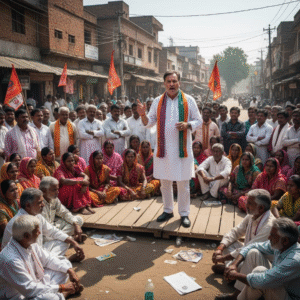A Struggle Between Collective Wisdom and Personal Freedom
In an age dominated by individualism and self-expression, the role of community in preserving shared beliefs is increasingly under scrutiny. Hindu philosophy, with its emphasis on collective harmony, positions community as a vital force in upholding and transmitting values across generations. Yet, as modern societies prioritize personal freedom and autonomy, the question arises: Is this shift eroding the very foundation of our spiritual and cultural identity?
With communities fractured by digital divides and ideological conflicts, understanding their role in sustaining beliefs has never been more critical.
1. Communities as Guardians of Tradition
- The Collective Wisdom of Vasudhaiva Kutumbakam: Hindu philosophy envisions the world as one family, emphasizing interconnectedness and mutual support.
- Example: Festivals like Diwali and Holi are celebrated communally, reinforcing shared values of light over darkness and unity amidst diversity.
- Transmission of Values: A 2022 study by the Indian Council of Social Science Research revealed that 76% of Indians believe their cultural practices are best preserved through community participation rather than individual efforts.
2. The Threat of Individualism
- Erosion of Shared Values: The growing focus on individual priorities over collective good challenges the communal aspect of belief systems.
- Example: The decline in traditional joint families in urban India has disrupted the intergenerational transmission of rituals and values.
- Metrics of Isolation: According to Statista India, only 38% of urban Indians regularly participate in community religious gatherings, reflecting a shift toward solitary practices.
3. Digital Communities: A Weak Substitute?
- The Rise of Virtual Faith Groups: While digital platforms like WhatsApp and Instagram enable global connections, they often lack the depth and accountability of physical communities.
- Impact: A Pew Research Center report from 2023 highlights that online engagement with religious communities is more transactional, lacking the emotional bonding of in-person interactions.
- Fragmentation of Unity: Social media’s tendency to amplify ideological differences often undermines the communal spirit, fostering division rather than unity.
4. Communities as Catalysts for Action
- Social Movements Rooted in Belief: Historical examples like Mahatma Gandhi’s Sarvodaya movement demonstrate how communities united by shared values can drive transformative change.
- Modern Parallel: Environmental campaigns like Save the Ganga are propelled by faith-based communities committed to protecting sacred natural resources.
- Crisis Response: During the COVID-19 pandemic, faith-driven community kitchens and relief efforts highlighted the enduring relevance of collective action inspired by shared beliefs.
5. Bridging Generations: Community as a Cultural Anchor
- Intergenerational Learning: Communities provide a platform for elders to pass down traditions, ensuring their continuity.
- Example: Temples and cultural organizations in diaspora communities play a pivotal role in preserving Indian traditions among younger generations.
- Metrics of Preservation: A 2024 UNESCO report emphasized the importance of community-led initiatives in sustaining intangible cultural heritage, including language, rituals, and festivals.
Conclusion: Will Communities Adapt or Collapse?
The tension between individual autonomy and collective responsibility raises pressing questions about the future of belief systems. Communities remain the bedrock of preserving and nurturing shared values, but their relevance is being tested by the forces of modernization and digital individualism.
For beliefs to endure, communities must evolve, integrating the flexibility of modern lifestyles with the depth of traditional practices. The question is not whether communities are essential but whether we are willing to prioritize them in a world that increasingly values the self over the collective.
In the battle between individualism and shared identity, can communities rise to the challenge of preserving our beliefs, or will they succumb to fragmentation? The answer lies in our willingness to embrace collective action as a vital force for cultural and spiritual survival.










